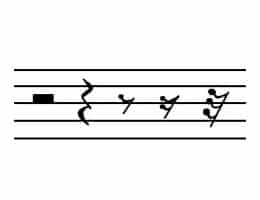 A pause is, in the broadest sense of the term, an interruption . Depending on the context, the notion can acquire different specific meanings.
A pause is, in the broadest sense of the term, an interruption . Depending on the context, the notion can acquire different specific meanings.
The pause is usually a stoppage or a brief stop , since the action is resumed soon. In the field of television, the advertising period is referred to as a pause because it interrupts the broadcast. For example: “After the break, we will be talking with the director of the new Superman movie,” “According to several people who were in the studio, the journalists argued during the break,” “I have to call my girlfriend .” , but I'm going to wait for the break so I don't miss any scenes in this chapter."
In various activities, the break allows you to rest or provides the time necessary to satisfy certain needs (eating, going to the bathroom, etc.). Four students who are doing practical work in a group, for example, can pause to distract themselves for a while and then return to focus on the task. In a work meeting, participants can also break for lunch.
The idea of pause, on the other hand, appears in the field of music . In this framework, it is a period where one stops playing or singing . In linguistics, pausing involves stopping phonation to define discourse or intonational units.
Music and linguistics are two fields in which pauses are of great importance. In the first case, it is a basic component when interpreting a melody because it gives us the possibility of articulating it and giving space to various instruments. For example, in a song, the vocalist's pauses can be used to listen to the lines of the instruments, just as there can be silences between them that allow certain musicians to show off with the so-called "solos."
While in instruments such as the piano, guitar and violin, among others, the continuity of the performance depends solely on the musician's energy, wind instruments require him to breathe and administer his oxygen in a healthy way, which is why the pauses are necessary not only for aesthetic reasons but also for natural reasons. In any case, a song in which its instruments never pause could become unbearable or very difficult to understand, and this connects us back to linguistics.
 In communication we depend on the pause to articulate our speech, to give the receiver time to decode each of its parts and also to elaborate the rest of the message. All this without forgetting breathing, which is also essential for speaking.
In communication we depend on the pause to articulate our speech, to give the receiver time to decode each of its parts and also to elaborate the rest of the message. All this without forgetting breathing, which is also essential for speaking.
Writing also benefits from pausing, and in fact needs it to express different ideas with the same words. Let's look at an example: "Clara enters the house" does not mean the same as "Clara, enters the house." The first sentence tells us that a person named Clara enters her house; The second, however, is an order given to him by another individual, who tells him to enter the house.
To read both sentences correctly, we must pause longer where the comma is located than in the rest of the spaces between the words. As a mental exercise, we can think about the time it would take us to say the word "comma", and remain silent until we finish. Curiously, many people have difficulty reading pauses, although they execute them naturally in speech.
When playing content, whether on CD, DVD, digital file or other format, pausing means stopping playback . When you resume it, it restarts from the exact moment of the pause.
